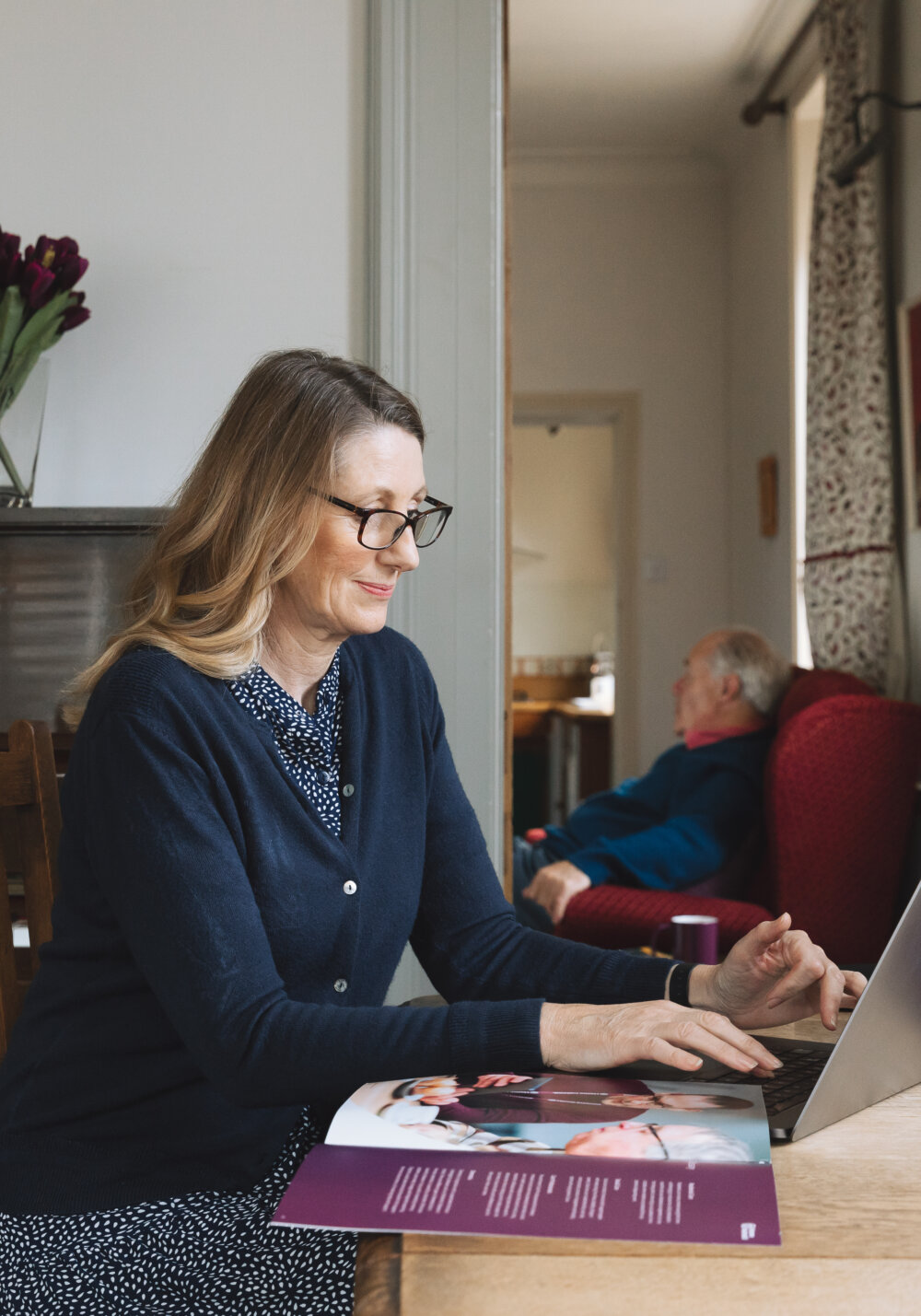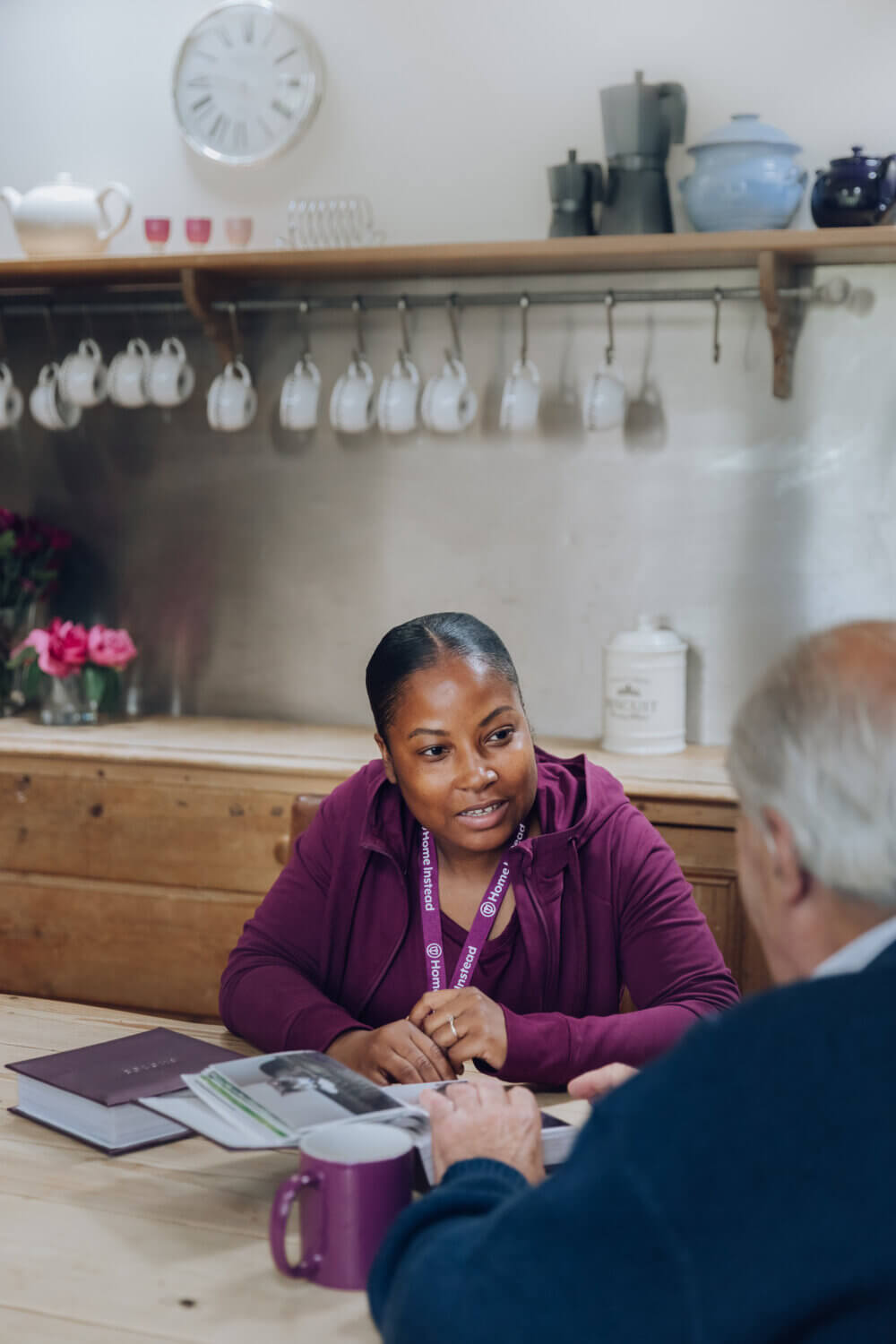The care discussion: How to handle an elderly relative refusing care
Discussing care needs with an elderly relative can be difficult, depending on the specific requirements of your loved one and their attitude to receiving help. For some, companionship and help around the home is welcomed with open arms, whereas others see this as losing their independence.

Assuring your loved one of the positive aspects of receiving care can be tricky if their mind seems made up, so here, we’re tackling the difficult subject of organising home care for an elderly relative if they are refusing help.
At Home Instead, our aim is to help people age positively and in place, which means bringing expert care to them at home. This helps them to live independently and enjoy a stimulating life where they’re most comfortable. We’ve helped thousands of families, so whatever situation you’re facing, or whatever your questions about home care, Home Instead can help.
When is it time to arrange care for an elderly loved one?
It can feel very strange to discuss care needs with an elderly relative if they used to care for you as a child. We often see our parents as invincible for most of our lives, but eventually the time comes when they need help to live safely and comfortably in their own home. This transition is easier when your loved one accepts their need for help, but it can be challenging if they are in denial about their needs and refusing the care that will help them. Research from Age UK in 2019 showed 15% of the 65+ population struggle without the help they need to carry out essential daily tasks like getting out of bed, and getting washed. For this reason, it’s important to keep a watchful eye over loved ones in case they are silently struggling with these everyday activities. You may find our guide on How To Tell If You Or A Loved One Needs Support helpful for knowing when the time is right to start discussions about care. If you are unsure how to start this discussion, here are a few things to keep in mind:

Listen to their reasons for refusing
Research shows 2 in 3 people aged 70+ say they have not shared their plans for care with their adult children, so you may feel in the dark about your loved one’s thoughts on home care. Alternatively, your relative might be adamant they do not want home care from a stranger, or feel they don’t need it. Rather than pressuring them to receive care regardless, it is important to listen to their objections and personal reasons. Try to understand any doubts or fears they may have so you can respond appropriately to put their mind at ease. It can sometimes feel like an elderly relative is simply being ‘difficult’, but more often than not there is an underlying reason for their objections, and understanding this can make subsequent discussions easier for both of you.

Some of these reasons may include:
- A belief that home care equals moving to a care home – Remind them home care can be adapted as their needs change, so there is no reason to assume they will end up in a care home. Home care is flexible, so they can remain in their own home as long as they want to.
- A fear that they will lose their independence – Elderly people’s autonomy is important for their wellbeing, so it is important to respect their needs, wishes and values. Make it clear they will be involved in any decision-making when it comes to the type of care they need and the people coming in and out of their home.
- A fear that they won’t get a say in their daily activities – As above, remind them their daily routine can be whatever they feel comfortable with, and they will retain control over this.
- A fear of loss of dignity – Having to accept personal care from a stranger can be a difficult objection to handle, as many people are embarrassed to receive help with intimate things like going to the bathroom and getting washed. Remind them that carers are qualified professionals trained in helping with things like this. They will always respect your wishes, make you feel comfortable and do everything possible to preserve your dignity while helping you feel fresh and clean every day.
- A feeling of guilt – Studies have found that care receivers often feel guilty and embarrassed by receiving more care than they can give in return. Remind your loved one they may have spent years of their life looking after other people, and now it is their turn to accept help without guilt. Assure them that carers want to help them, and they should never feel like a burden.
- Worries about paying for treatment – Often elderly people worry they won’t be able to afford the care they need, or that their family members will be out of pocket as a result. Assure them there are options when it comes to financing care, and involve them in discussions about how this works. You may find our guides on The Cost of Home Care and Paying for Care helpful for this discussion.
- Concerns about stigma – Some elderly people may have concerns about others in their social circle finding out they require care. This comes back to an embarrassment about the need for care, as this can affect their pride. Remind your loved one that if they would prefer, none of their friends or other family members need to know the details of their care, as this can take place at home at times that suit them and is entirely private.
- A fear that you or other loved ones will visit less – This can be a difficult discussion to have, as your elderly relative may worry that – by accepting home care – they will see their loved ones less. It can help to remind them of your commitment to visiting, and assure them that even if they see you less as a result of home care, it can make visits more enjoyable and enriching as you can focus on doing activities together and catching up properly without distractions like housework or cooking.
- A denial about becoming older – Some elderly people feel they don’t need help, and would rather struggle than accept they are getting older. This can be a difficult conversation if they are refusing something you feel is an obvious need, but try to stay calm and listen to their perspective. The conversation may need to be had a few times for them to accept assistance. Also, if your loved one is refusing safety devices like personal alarms due to their association with becoming older, consider work-arounds that offer similar protection without the perceived stigma, like a voice-activated alarm or hidden emergency button.
- A fear of strangers in their home – Many elderly people worry about being on their own with a stranger, and this is an understandable fear. Assure your loved one that person-centred care is the goal, so they will always be fully involved in decisions about who comes into their home and how often. Also, remind them that initial meetings with carers and trial periods can be arranged, so they will get to decide whether or not they enjoy the company of their carer, and can switch if needed. At Home Instead, we take into account the personalities and likes/dislikes of each individual to ensure they are matched well with the best carer for them.
- A negative perception of the healthcare system – Some elderly people will refuse things like hospital or care home admission, and this attitude can make them sceptical of home care too. Helping them to better understand home care and what this involves can be useful. You may find our guide on What Is Home Or Domiciliary Care? helpful for this discussion. Remind them they will be heavily involved in their own care planning, and can decide what help they need and when.
Broach the subject early
One of the best ways to approach care discussions if an elderly relative is hesitant to receive care is to bring up the subject early – long before the person actually needs help. Without any urgency to organise care, it can be easier to ask questions like: “What are your thoughts on installing a stair lift now so it’s there if you ever need it?”By introducing the idea gradually rather than all at once, your loved one can start to consider it themselves and become more comfortable with the idea when it’s needed down the line. It can be useful to suggest having, for example, a carer pop in once a week to do any difficult housework chores so they start to get used to having someone in the house regularly. It’s true that sometimes we don’t have the time to gradually work up to the subject of arranging home care, but if it’s possible, a staggered approach can be a really useful way to bring it up when care is still a nice-to-have rather than a must-have.

Come to the discussion prepared
If you are trying to have a serious discussion with your elderly relative about arranging care more imminently, it can help to approach the subject having done some initial research into the types of care available, what you think would help your loved one most, and the cost of implementing each type of care. A pros and cons list could be useful, or collecting some recommendations from others who have already started using home care services. You might find some of our guides helpful in your research:
Remember, your loved one may have already thought about their care needs and how they feel about certain elements of this. Don’t dive in with your own research on the subject until you have asked them their opinion on home care and what they think might suit them best. Find out what they think, and follow up with the research you have done.

How to have a discussion about arranging home care
Home care can be a solution that many elderly people are open to, as it provides an excellent alternative to moving to a care home. By considering creative ways to solve your loved one’s problems using flexible home care services, you can discuss a middle ground that keeps them safe while also respecting their wishes and routine within their own home.
Here are a few tips for having the discussion about arranging home care:
- Talk in person rather than over the phone, and whether you are bringing it up casually or in a more serious manner, make sure there are no distractions.
- Try not to focus on the things they cannot do (for example, “You’re too unsteady on your feet to do housework now”), and instead, focus on solutions that could help improve their life (for example, “Having someone come in weekly to help with housework could make it safer for you and free up more of your time”)
- Assure your loved one that you will still be around to help with the transition. Often elderly people fear change, so make sure they feel secure and that you are not going to throw them in at the deep end with a stranger.
- Never talk down to an elderly relative, interrupt them, or assume you know what’s best. Treat them as adults and consider their opinions within the discussion. You should be able to work towards an agreement that keeps everyone happy.
- Share the many benefits of home care with them, and ask if they can see themselves benefitting from any of the points you mention.

Benefits of home care
When discussing home care with a loved one, it can help to mention benefits such as:
- It can help elderly people maintain their independence – research suggests interventions to maintain independent living have the potential to improve health perception and self-efficacy in seniors.
- It enables elderly people to stay in familiar, comfortable surroundings, which can be particularly helpful for those with dementia.
- It can help people feel more secure in case of emergencies.
- It can make everyday life easier with some extra help around the house.
- It ensures there is always a friendly face to chat to.
- It enables elderly people to see more of their friends and family, keep their pets, and remain within their community.
- It is flexible, so you only pay for the care you need rather than automatically receiving full-time care. Whether it’s companionship and help with housekeeping, or specialist care such as diabetes monitoring or dementia care, there are flexible options to suit.

What to do if an elderly person refuses care?
It can be tough if an elderly relative is refusing to discuss their care needs, so if all of the above is not working and they are still saying no to care, you may want to try:
- Ask open-ended questions about how they plan to handle future limitations such as mobility problems or an inability to perform personal care tasks
- Have the discussion several times to allow them time to think about some of your points.
- Ask them what they believe they need – remember, person-centred care is crucial so they should be in charge of the discussion.
- Encourage them to consult a doctor or another healthcare professional who can give their opinion. Sometimes people find it easier to hear suggestions from a professional rather than a family member, and doctors are often experienced in people refusing care so they may have some communication tools up their sleeve.
- Rather than trying to convince a loved one to implement an entire system of care, start with one thing, and this should be the most urgent need. For example, if you are worried about a loved one falling at home, focus on getting them a wearable alarm that can alert someone if this happens. The next point of call can be grab rails or something similar around the home, but an alarm is a good first step.
- Take them to visit a friend or relative who may already have home care in place. They may be better placed to discuss the potential benefits, and explain how much easier and safer life feels since getting home care. This is not about getting reinforcements for you, but rather, finding someone with the relevant lived experience of home care who can hopefully offer a new perspective.
- Explain your reasons for wanting to arrange care, which might include things like worrying about them, or feeling overwhelmed with care responsibilities. This shouldn’t be about making them feel guilty, it is about helping them understand why home care could benefit you too.
- Ultimately, put your loved one in the driving seat so they can choose what they feel would make life easier, what kind of help they would like, and which service they would like to try. It can help to arrange a trial period with a few different carers until they decide the fit is right.
Where to get support if someone is refusing care
In a survey asking participants their reasons for leaving work to care for elderly parents, one of the top responses was “there is no one else who can help”. With studies revealing almost 5% of the population are providing 20 hours of unpaid care or more every week, it is normal to start feeling overwhelmed by caring duties. If you aren’t sure what to do about a loved one refusing care, do not give up on having the care discussion.
Continue to bring this up as often as feels appropriate, and engage the help of others who can assist such as your relative’s GP or healthcare team. You can also reach out to us at Home Instead to discuss the types of home care that could be useful, and arrange a home visit so your loved one can meet their potential carer and discuss the idea of home care with a professional. This will hopefully answer their questions and put their mind at ease.
Our Care Professionals are the best of the best, and highly trained to deliver the services you need. No matter what type of home care you are looking for, we can provide a tailored service that suits you or your loved one.
We’re an award-winning home care provider and part of a worldwide organisation devoted to providing the highest-quality relationship-led care for older people in their own homes. Arranging care for yourself or your loved one shouldn’t be stressful, so whatever questions you would like answered, feel free to reach out to the Home Instead team to discuss your needs.


Diane WIlliams , Head of Quality & Standards
Before joining Home Instead, I built a comprehensive career in the social care sector, beginning in 1991 as a frontline care worker and advancing to senior leadership roles across both private and voluntary sector businesses.
Throughout my career, I have supported diverse care groups in a variety of settings, including community, residential, nursing, and secure environments. My experience spans working with older adults, including those living with dementia; individuals with physical disabilities and complex, long-term health needs; people with learning disabilities, including autism; individuals with enduring mental health challenges; individuals with current or past substance use and those with forensic backgrounds.
In 2002, I qualified as a social worker and have since maintained my professional registration with Social Work England.